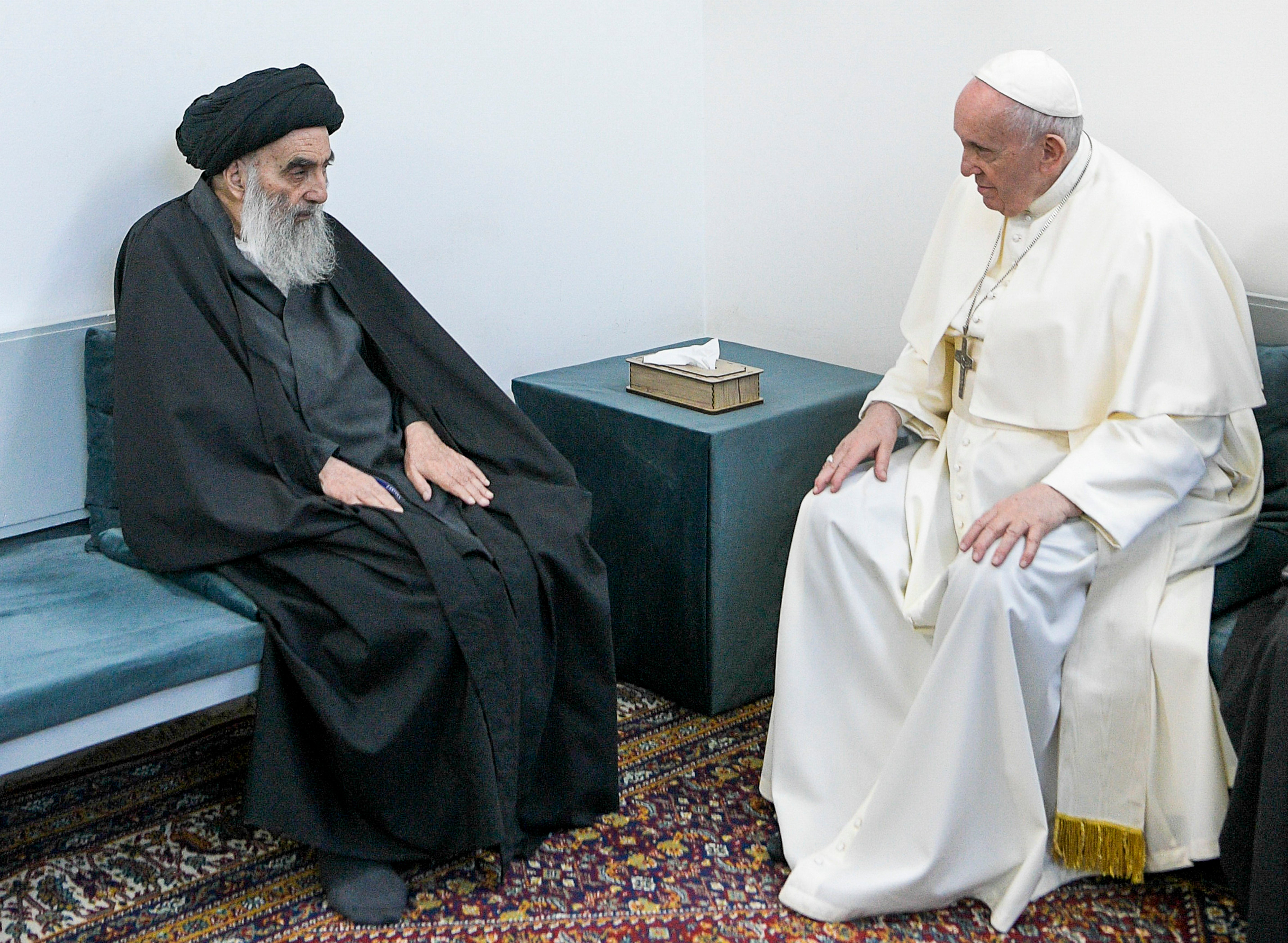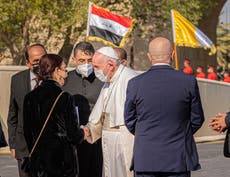‘Destroyed, ransacked, ruined’ – the people of Iraq need more than the Pope’s impassioned pleas
For many in Iraq, the real test will be in the coming months, long after the Pope returns to the Vatican, writes Bel Trew


Clad in white, Pope Francis sat on a gleaming throne in the Iraqi city of Mosul, dwarfed by slabs of concrete that dangled limply from the metal sinews of bombed out buildings.
His small stage was cradled by several destroyed churches and a primary school, the cartoon murals scratched out by Islamic State militants. Just a few hundred metres away were the ravaged remains of the Nouri Mosque. It was here, in the summer of 2014, that Isis announced the unfurling of their caliphate and Abu Bakr al-Baghdadi vowed to march on and conquer Rome.
A few years ago, it would have been unthinkable to have the pontiff sitting in Mosul’s Church Square, surrounded by children and families singing Christian songs and waving olive branches. As one young man, who lived under Isis in Mosul, tweeted (alongside his Isis charge sheet), he had been publicly flogged in Church Square six years ago for getting a crew cut, while Isis fighters shouted they would conquer Rome.
Now, the most recognisable emblem of Rome was in the exact same spot – preaching peace.
For the last three days, the 84-year-old, limping from a painful flare up of sciatica, has visited areas of Iraq few foreign dignitaries would be brave enough to go. While there has been some criticism about the timing of the trip, given the unprecedented surge in coronavirus cases, the overwhelming reaction in Iraq was one of exhausted hope, and often gratitude.
The Pope has toured the country, at breakneck speed, travelling from the western city of Najaf, the holiest city in Shia Islam, to the Mesopotamian ancient site of Ur in the south. Whether in Baghdad or Mosul, he has hammered home the same message: peaceful coexistence, equal rights for Iraq’s minorities and the need for Christians to return home.
It is much needed in a country where the Christian population has dwindled from over a million before the US-led invasion of the country in 2003 to just 200,000 today because of persecution and violence that many say feels existential. It is not just Christians; other minorities, like the Yazidis and Turkmen, feel unwelcome, too.
“We reaffirm our conviction that fraternity is more durable than fratricide. That hope is more powerful than hatred, that peace more powerful than war,” the Pope said in an impassioned plea from Mosul. “How cruel it is that this country, the cradle of civilisation, should have been afflicted by so barbarous a blow, with ancient places of worship destroyed and many thousands of people – Muslims, Christians, Yazidis and others – forcibly displaced or killed.”
The question now is whether this incredible stunt by the Pope will achieve anything, whether these heartfelt pleas will bear fruit. The country’s political and Muslim leaders who met the Pope have all vowed to safeguard and ensure the rights of the minorities but those who have born the brunt of Iraq’s several circles of hell say they need deeds not words.
“I lived 18 days under Isis and watched them rip up my home, take all my most precious belongings and then ransack everything,” explains Salma, a Christian woman from Mosul who said her primary school was the chewed-up building the Pope stood beside on Sunday. “We eventually had to leave when they said you could stay and convert, pay Jizya [a tax on non Muslims] or leave.”
She has yet to return to Mosul since she fled in 2014. “The future of Iraq right now, as it stands, looks like this school – destroyed, ransacked, ruined,” she added bitterly. “God willing, the government will alter that and the Pope’s words will change things for the better.”
An hour’s drive away in Qaraqosh, once the main Christian city in Iraq, only about a third of the pre-Isis population of 60,000 have returned to the city. The Pope gave a mass at the main Cathedral, which has been spectacularly renovated after his visit to Mosul.
There, the same sentiment was shared. “Today we are missing more than half of the families that used to live here and, to be frank, most won’t come back,” Yousif Anis, a church volunteer from the city, told me. “There is a demographic change that started well before Isis accelerated everything.
“We feel that a lot of different actors want to take this city and others from us.”
So, for many in Iraq, the real test will be in the coming months, long after the Pope returns to the Vatican. And time may be running out.



Join our commenting forum
Join thought-provoking conversations, follow other Independent readers and see their replies
Comments